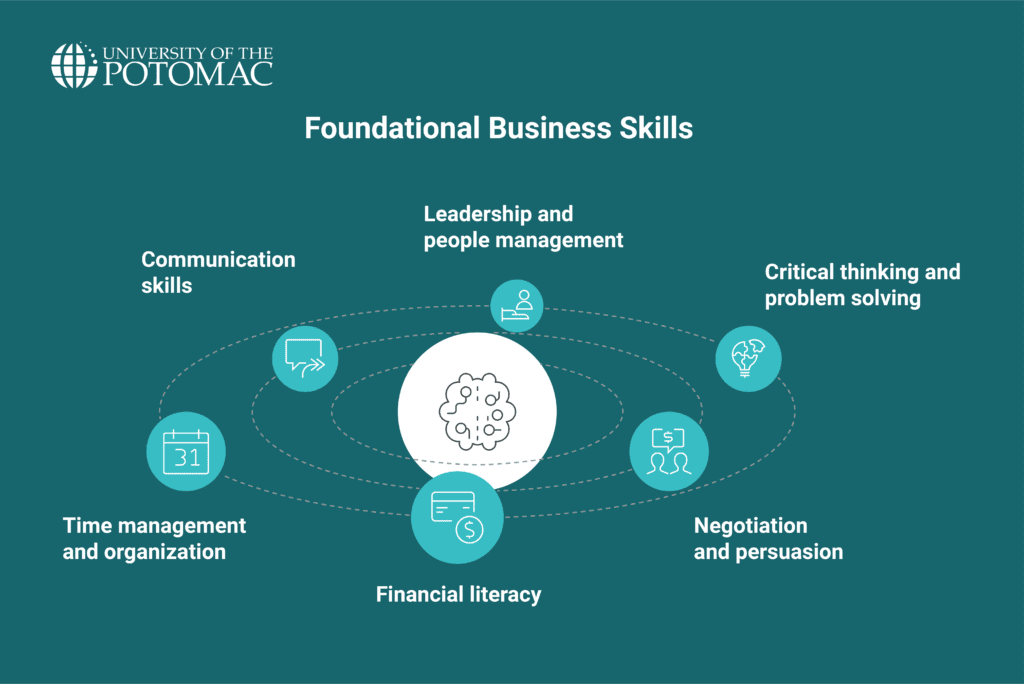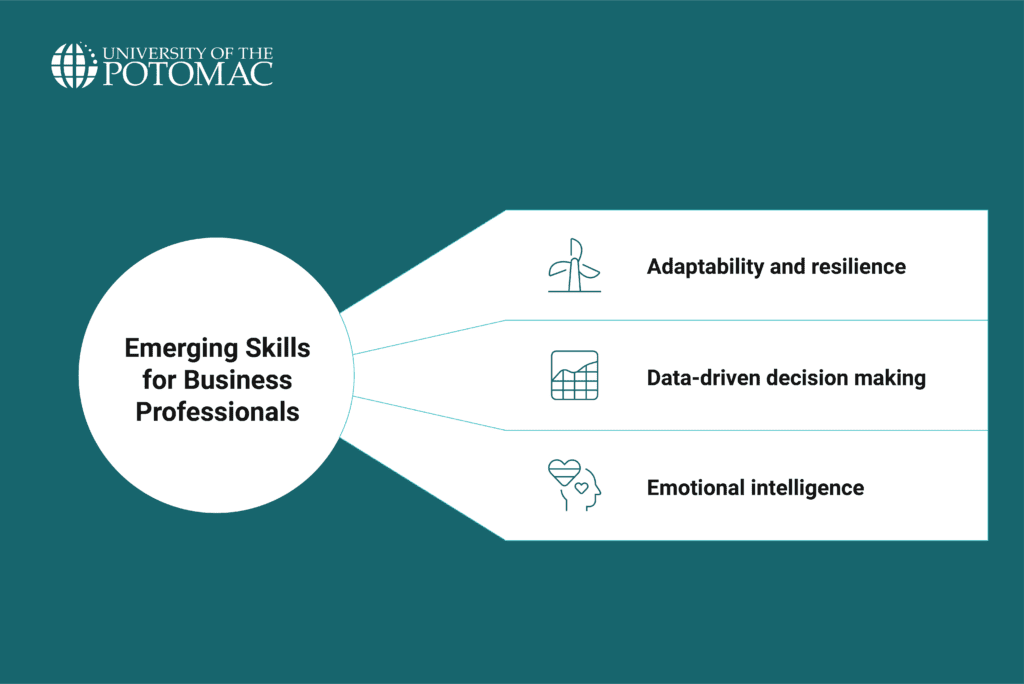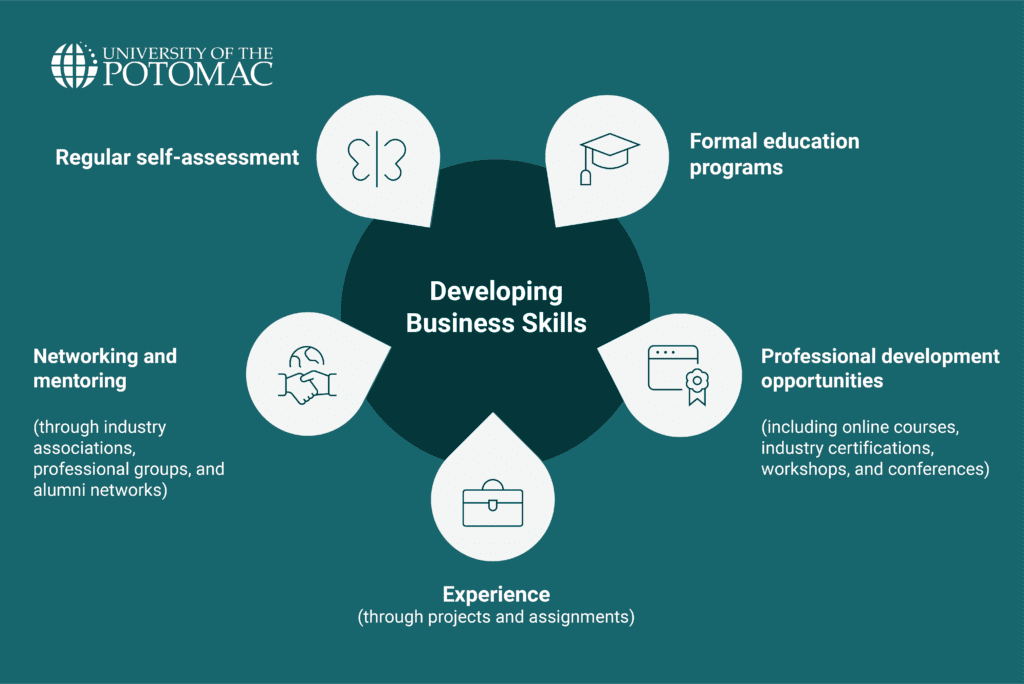Key Takeaways
- Master foundational business skills like communication, leadership, and financial literacy to excel in any role or industry.
- Develop emerging skills such as data-driven decision making and emotional intelligence to stay competitive in today’s evolving workplace.
- Continuous learning and practical application are essential for building and strengthening your business skill set throughout your career.
Whether you’re climbing the corporate ladder, launching your own business, or changing careers entirely, one thing remains constant: the need for strong business skills. These essential capabilities serve as the foundation for professional success across every industry, from healthcare and technology to manufacturing and education.
Business skills are the core competencies that enable you to work effectively in any professional environment. They’re the tools that help you communicate with colleagues, solve complex problems, manage resources, and lead teams toward common goals. Unlike technical skills that might be specific to one field, business skills are transferable, making them invaluable investments in your career future.
As the modern workplace evolves, remote work, digital transformation, and changing consumer expectations are reshaping how we do business. As a result, professionals need both timeless fundamentals and emerging capabilities to succeed in business.
Core Business Skills Everyone Should Master

Regardless of your job title, industry, or career stage, mastering core business competencies will help you work more effectively and advance your career goals.
Communication skills
Strong communication is the cornerstone of every successful business relationship. This goes far beyond just speaking clearly; it encompasses verbal, written, and non-verbal communication in every professional interaction.
In a business environment, you’ll need to present ideas to stakeholders, write clear emails that get results, and listen actively to understand others’ perspectives. Whether you’re collaborating with team members, building client relationships, or stepping into leadership roles, your ability to communicate effectively determines how well you can influence, inform, and inspire others.
Key aspects of business communication include:
- Active listening to truly understand before responding
- Clear, concise writing that respects your reader’s time
- Confident public speaking and presentation skills
- Non-verbal awareness in face-to-face and virtual meetings
- Adapting your communication style to different audiences
Leadership and people management
Leadership is about influence, decision-making, and motivating others regardless of your position on the organizational chart. True leadership means inspiring people to work toward shared goals while developing their own capabilities.
Effective leaders know how to manage conflict constructively, provide meaningful feedback, and build trust within their teams. They understand the difference between managing tasks and leading with vision. Even if you’re not in a formal management role, developing leadership skills helps you take initiative, guide projects, and become someone others turn to for guidance.
When working with diverse teams across different generations, backgrounds, and work styles, the ability to connect with people, understand their motivations, and bring out their best performance is what separates good leaders from great ones.
Critical thinking and problem solving
Every business faces challenges, from daily operational issues to strategic decisions that shape the company’s future. Critical thinking and problem-solving skills help you address these challenges systematically and make sound decisions based on logic and evidence.
These skills involve analyzing information objectively, identifying root causes rather than just symptoms, and evaluating potential solutions before taking action. In practice, this might mean troubleshooting a customer service issue, optimizing a workflow process, or developing a new market strategy.
Strong critical thinkers remain open-minded while being appropriately skeptical. They ask the right questions, gather relevant data, and consider multiple perspectives before reaching conclusions. This approach leads to better outcomes and builds your reputation as someone who can be trusted with important decisions.
Time management and organization
With competing priorities and endless distractions, effective time management has become a crucial business skill. It’s about more than just staying busy; it’s about focusing your energy on activities that create the most value for your organization and career.
Successful time management starts with clear goal setting and prioritization. You need systems to organize tasks, deadlines, and responsibilities while maintaining flexibility for unexpected opportunities or urgent issues. This includes learning to delegate appropriately, saying no to non-essential requests, and creating boundaries that protect your most productive hours.
Common time management strategies include:
- The Eisenhower Matrix for prioritizing urgent vs. important tasks
- Time-blocking to dedicate focused periods to specific activities
- Digital tools and apps that streamline scheduling and task management
- Regular review sessions to assess progress and adjust priorities
Financial literacy
You don’t need to be a financial expert to benefit from financial literacy, but understanding basic business finances helps you make better decisions and communicate more effectively with colleagues across departments.
Financial literacy includes reading and interpreting financial statements, understanding budgeting and forecasting processes, and grasping key financial metrics that drive business decisions. This knowledge helps you see how your work contributes to the organization’s financial health and success.
For entrepreneurs and business owners, financial literacy is even more critical. You’ll need to manage cash flow, understand profit margins, evaluate investment opportunities, and make data-driven decisions about resource allocation. Even employees benefit from understanding how their department’s budget works and how to present financial arguments for new initiatives or resources.
Negotiation and persuasion
Negotiation and persuasion are distinct but related skills that help you achieve better outcomes in business relationships. Negotiation involves finding mutually beneficial solutions when interests don’t initially align, while persuasion focuses on influencing others to support your ideas or proposals.
These skills apply in numerous business situations: negotiating contracts with vendors, persuading leadership to approve your project proposal, resolving conflicts between team members, or securing resources for your department. Success in both areas requires preparation, empathy, and understanding what motivates the other party.
Effective negotiators focus on creating value for everyone involved rather than just winning. They prepare thoroughly by researching the other party’s needs and constraints, develop multiple options for agreement, and maintain relationships even when specific negotiations don’t succeed.
Digital literacy and tech proficiency
Technology proficiency is no longer optional in most business roles. Comfort with digital platforms, spreadsheet software, customer relationship management (CRM) systems, and other tools can significantly improve your efficiency and marketability.
Being tech-savvy makes you more competitive in the job market. It also enables you to adapt quickly when organizations adopt new systems or when technological changes reshape your industry.
This doesn’t mean you need to become a programmer, but you should be comfortable learning new software, troubleshooting basic technical issues, and leveraging technology to solve business problems. In many roles, you’ll also need to help less tech-savvy colleagues adapt to new systems.
Emerging Business Skills for the Modern Workplace

Today’s workforce must develop new capabilities that build on foundational business skills while ensuring continued relevance in an evolving business landscape.
Adaptability and resilience
Change has become the only constant in modern business. Market conditions shift rapidly, new technologies disrupt established practices, and global events can transform entire industries overnight. Professionals who thrive in this environment have developed strong adaptability and resilience skills.
Adaptability means staying flexible when plans change, embracing new ways of working, and viewing challenges as opportunities for growth rather than obstacles. Resilient professionals bounce back from setbacks, learn from failures, and maintain productivity even during periods of uncertainty or stress.
Building adaptability involves:
- Staying curious and continuously learning new approaches
- Developing multiple contingency plans for important projects
- Practicing stress management techniques to maintain performance under pressure
- Seeking feedback regularly and adjusting your approach based on results
Data-driven decision making
Data has become central to business strategy across all industries. Even if you’re not a data analyst, you need basic skills in interpreting key performance indicators (KPIs), understanding dashboard reports, and using data to support your recommendations and decisions.
Interested in pursuing a degree?
Fill out the form and get all admission information you need regarding your chosen program.
This will only take a moment.
Message Received!
Thank you for reaching out to us. We will review your message and get right back to you within 24 hours.
If there is an urgent matter and you need to speak to someone immediately you can call at the following phone number:
- We value your privacy.
Data-driven decision making involves gathering relevant information, analyzing trends and patterns, and using evidence rather than just intuition to guide your choices. This approach leads to more accurate predictions, better resource allocation, and stronger accountability for results.
You don’t need advanced statistics to do this effectively, but you should be comfortable reading standard business metrics, distinguishing between valid and unreliable data sources, and presenting data-based arguments persuasively to peers and leaders alike.
Emotional intelligence
Emotional intelligence (EQ) has become a defining factor in workplace success, often outweighing technical expertise when it comes to leadership potential and career growth. EQ involves understanding and managing your own emotions while recognizing and responding appropriately to others’ emotional states.
High emotional intelligence improves communication, enhances collaboration, and strengthens leadership effectiveness. It helps you navigate workplace conflicts, provide constructive feedback, and build stronger professional relationships across all levels of an organization.
Components of emotional intelligence include self-awareness, self-regulation, empathy, and social skills. Developing these capabilities takes practice and reflection, but the rewards (better team dynamics, stronger workplace connections, and greater career advancement) are well worth the effort.
How to Develop Business Skills

Building business skills requires a combination of formal learning, practical application, and continuous self-assessment. The good news is that you have multiple pathways to develop these capabilities, regardless of your current experience level or educational background.
Formal education programs like those offered at University of the Potomac provide structured learning environments where you can build foundational knowledge while applying concepts to real-world business scenarios. A BS in Business program or an Associate of Business program offers comprehensive coverage of essential business skills along with specialized knowledge in your area of interest.
Professional development opportunities include online courses, industry certifications, workshops, and conferences that focus on specific skills. Many of these options offer flexibility for working professionals who need to balance learning with existing responsibilities.
Learning by doing often provides the most valuable experience. Volunteer for cross-functional projects, seek stretch assignments that challenge your current capabilities, or propose solutions to problems you’ve identified in your workplace. Each opportunity helps you practice business skills in realistic situations while demonstrating your value to employers.
Networking and mentoring accelerate skill development by connecting you with experienced professionals who can share insights, provide feedback, and offer guidance on your career path. Industry associations, professional groups, and alumni networks create opportunities to build these valuable relationships.
Regular self-assessment helps you identify skill gaps and track your progress. Seek feedback from supervisors, colleagues, and clients about your performance. Be honest about areas where you need improvement and create specific plans to address those gaps.
The Bottom Line
Success in today’s business environment requires a strategic combination of foundational and emerging skills. The core competencies (communication, leadership, critical thinking, time management, financial literacy, negotiation, and digital proficiency) remain essential across all industries and career levels. Meanwhile, emerging skills like adaptability, data-driven decision making, and emotional intelligence have become increasingly important for staying competitive.
Developing these skills takes deliberate effort. Combining formal education, practical experience, and ongoing learning ensures you remain prepared for new opportunities and challenges. By actively investing in your professional growth, you position yourself for long-term success.
University of the Potomac’s business programs are designed specifically for working adults who want to build these essential skills while maintaining their current responsibilities. Our flexible online and hybrid formats make it possible to earn your degree and develop the business competencies that employers value most.
Ready to strengthen your business skills and advance your career? Explore our programs and discover how University of the Potomac can help you achieve your professional goals.
Frequently Asked Questions (FAQs)
What’s the difference between business skills and leadership skills?
Business skills are the broad set of competencies needed to work effectively in any professional environment, including communication, financial literacy, and problem-solving. Leadership skills are a subset of business skills focused specifically on influencing, motivating, and guiding others toward common goals.
Can business skills be learned later in life?
Absolutely. Business skills can be developed at any stage of your career through formal education, professional development programs, and practical experience. Many successful professionals strengthen their business skills throughout their careers as they take on new responsibilities and adapt to changing workplace demands.
What are the most in-demand business skills for 2025?
The most sought-after business skills combine traditional competencies with emerging capabilities: strong communication and leadership abilities, digital literacy, data analysis and interpretation, emotional intelligence, adaptability, and cross-cultural collaboration skills.
How long does it take to develop strong business skills?
The timeline varies depending on your starting point and learning approach. Some skills, like basic communication, can improve quickly with focused practice, while others, like strategic thinking, develop over months or years of experience.
Are business skills more important than technical skills?
Both are important, but business skills often determine how effectively you can apply your technical expertise. Technical skills may get you hired, but business skills typically drive career advancement and leadership opportunities. The most successful professionals combine strong technical abilities with well-developed business competencies.










